|
|
|
Sort Order |
|
|
|
Items / Page
|
|
|
|
|
|
|
| Srl | Item |
| 1 |
ID:
173364
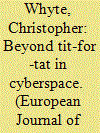

|
|
|
|
|
| Summary/Abstract |
At present, most scholarship on the potential for escalation in cyberspace couches analysis in terms of the technological dynamics of the domain for relative power maneuvering. The result has been a conceptualisation of the logic of operation in cyberspace as one of ‘tit-for-tat’ exchanges motivated by attribution problems and limited opportunity for strategic gain. This article argues that this dominant perspective overlooks alternative notions of how cyber tools are used to influence. This, in turn, has largely led scholars to ignore second-order effects – meaning follow-on effects triggered by a more direct outcome of an initial cyber action – on domestic conditions, institutions, and individual stakeholders. This article uses the case of cyber-enabled political warfare targeting the United States in 2016 to show how escalation can occur as a second-order effect of cyber operations. Specifically, the episode led to a re-evaluation of foreign cyber strategy on the part of American defence thinkers that motivated an offensive shift in doctrine by 2018. The episode also directly affected both the political positions taken by important domestic actors and the attitude of parts of the electorate towards interference, both of which have reinforced the commitment of military planners towards assertive cyber actions.
|
|
|
|
|
|
|
|
|
|
|
|
|
|
|
|
| 2 |
ID:
167441
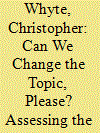

|
|
|
|
|
| Summary/Abstract |
A number of international relations scholars charge that the field suffers from academic religiosity: factional divisions along theoretical lines that limit research potential and create unnecessary bias against certain approaches. I explore this view of the field by applying a topic-modeling algorithm to a corpus of article abstracts from prominent journals in international relations. I generate a new dataset of information on international relations scholarship over more than two-and-a-half decades. I find evidence in support of claims that academic factionalism can negatively affect the research process. Paradigmatic foundations, though not present in most international relations studies, are closely linked to a large number of research topics and are associated with higher citation counts. At the same time, such works appear to be less likely than others to be “pathbreaking.” My analysis also supports a narrative common in recent scholarship that citation counts, though somewhat effective in their measurement of scholarly impact, are sensitive to organizational features of the academic process.
|
|
|
|
|
|
|
|
|
|
|
|
|
|
|
|
| 3 |
ID:
191518
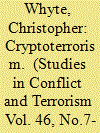

|
|
|
|
|
| Summary/Abstract |
Much recent policy discourse has pivoted on the relationship between terrorist campaigns and an emergent feature of the global financial landscape in the form of cryptocurrencies. Cryptocurrencies are a subset of digital currencies that are distributed by the developers thereof. The various unique features of cryptocurrencies have led to discussion in punditry about how terrorists could benefit from this new mode of financial transaction but few policy-oriented works and scholarly assessments exist to outline and assess this claim. This article describes cryptocurrencies, and assesses them in line with the operational realities of terrorist campaigns. I argue that, while there is limited evidence that terrorists are likely to disproportionately benefit from use of cryptocurrencies at present, there do exist unique opportunities for money laundering and revenue generation.
|
|
|
|
|
|
|
|
|
|
|
|
|
|
|
|
| 4 |
ID:
193521
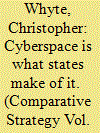

|
|
|
|
|
| Summary/Abstract |
Why do some strategic concepts come to dominate over alternative, often-entrenched views of warfighting? And what determines the staying power and proneness to change over time of the prevailing vision? Focusing on cyberspace, I describe the Internet as an artifact interpreted differently by competing interest groups. I show that reconciliation of these interpretations comes from individuals with the position and motivation to make technology work for a specific vision of use and spread that vision to other parts of the organization. By tracing the role of such key network nodes in the evolution of strategic concepts, I show that information technologies themselves act to break down barriers to engagement between social sub-elements of complex organization, making the whole susceptible to narrow parochial change. Moreover, I illustrate how the cyberspace concept is both impermanent and an attempt at problem redefinition leading to an ill-fitting lens, rather than simply a rhetorical-institutional reorientation.
|
|
|
|
|
|
|
|
|
|
|
|
|
|
|
|
| 5 |
ID:
148085
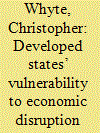

|
|
|
|
|
| Summary/Abstract |
Much of the literature on cyberspace and national security has backed away from the idea that cyberwar presents an imminent threat in world politics. However, there remains great concern about the potential for broad-scoped economic disruption prosecuted through digital means. How vulnerable are developed states to cyber economic warfare? Could either a concentrated cyber economic warfare initiative or a scalable disruption effect prove crippling on a large scale? And, most importantly, what are the implications for state policy and international interactions? This article contends that large, advanced industrial states are only superficially more vulnerable to disruption than are other types of systems.
|
|
|
|
|
|
|
|
|
|
|
|
|
|
|
|
| 6 |
ID:
161745
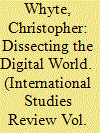

|
|
|
|
|
| Summary/Abstract |
Though focused on realizing markedly different analytic outcomes, each of the four books under review here approaches the task of balancing the technological ramifications of advancing digital developments against the implications of relevant sociopolitical context with a reasonable degree of success. Taken together, the books present several significant messages not only about prospects for cyber conflict but also about the aims and imperatives of the burgeoning cyberpolitics research program. In particular, these volumes do a great deal to move the discussion on cyberspace and interstate conflict beyond the bounds of traditional IR theories by demonstrating that the use of assumptions about the predigital world can constrain analytic attempts to understand the parameters of political phenomena in the digital age. Applied too strictly, some assumptions can lead to biased conclusions and overstated predictions, which in turn can have serious policy consequences. Moving forward, IR scholars face the serious task of reevaluating basic conceptual precepts and adapting them to produce new and useful models for understanding conflict, violence, and more.
|
|
|
|
|
|
|
|
|
|
|
|
|
|
|
|
| 7 |
ID:
150089


|
|
|
|
|
| Summary/Abstract |
The use of coercive instruments of statecraft and military power to affect changes in strategic behavior is a common feature of international politics. Recently, a variety of state and sub-state actors have attempted to utilize cyber instruments of disruption and intrusion to bring about favorable outcomes. This article notes that digital instruments for coercion offer limited potential for effective compellent effect in world affairs. Nevertheless, as the case of North Korea's 2015 hack and (attempted) manipulation of Sony demonstrates, coercion using cyber weapons of intrusion and disruption is possible under particular conditions. In describing these conditions, I argue that the limits of cyber coercion should be seen more as a function of relevant social and institutional context than of the current state of technological possibilities. Technology certainly determines parameters of coercive interaction between actors, but success—and thus most determinants of strategic decisions surrounding cyber coercion—derives directly from sociopolitical context.
|
|
|
|
|
|
|
|
|
|
|
|
|
|
|
|
| 8 |
ID:
189937
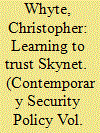

|
|
|
|
|
| Summary/Abstract |
The use of AI to automate defense and intelligence tasks is increasing. And yet, little is known about how algorithmic analyses, data capture, and decisions will be perceived by elite decision-makers. This article presents the results of two experiments that explore manifestations of AI systems in the cyber conflict decision-making loop. Though findings suggest that technical expertise positively impacts respondents’ ability to gauge the potential utility and credibility of an input (indicating that training can, in fact, overcome bias), the perception of human agency in the loop even in the presence of AI inputs mitigates this effect and makes decision-makers more willing to operate on less information. This finding is worrying given the extensive challenges involved in effectively building human oversight and opportunity for intervention into any effective employment of AI for national security purposes. The article considers these obstacles and potential solutions in the context of data gathered.
|
|
|
|
|
|
|
|
|
|
|
|
|
|
|
|
| 9 |
ID:
166279
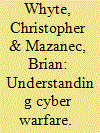

|
|
|
|
|
| Publication |
Oxon, Routledge, 2019.
|
| Description |
x, 296p.: ill.pbk
|
| Standard Number |
9781138640627
|
|
|
|
|
|
|
|
|
|
|
|
Copies: C:1/I:0,R:0,Q:0
Circulation
| Accession# | Call# | Current Location | Status | Policy | Location |
| 059644 | 355.4/WHY 059644 | Main | On Shelf | General | |
|
|
|
|
|
|
|
|
|